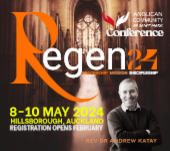Last September I boarded a plane with my wife to fly to England. And I didn’t really want to go.
You see, in 2006 I’d been involved in planting one of New Zealand’s few examples of a self-proclaimed Fresh Expression of church called ‘The Kitchen’. It was a challenging, stretching experience, but after three years it came to a natural end, and I guess I felt a bit burnt by the whole thing.
Soon after that, Bishop Graham Cray, who leads the UK Fresh Expressions team, came to New Zealand to run a conference. Next thing I knew I was booked to go and study alongside his team at the Pioneer Training Course at Ridley Hall in Cambridge.
However, since The Kitchen had finished, I’d now been ordained and domesticated. Gradually my thinking and theology had become very sensible. I’d realised that planting Fresh Expressions was too hard, too risky and painful, and supporting local parish ministry became my new focus.
So, while I was grateful for the opportunity to travel abroad and study at my tender age, the mandate I had for the study was a bit like a teenager being given a Wiggles DVD by a long-lost uncle.
It was a nice idea, but I’d moved on. But as is often the way, the Spirit had different plans for me.
First things first. For those new to this conversation, what exactly is a Fresh Expression? The official definition goes:
‘A fresh expression is a form of church for our changing culture established primarily for the benefit of people who are not yet members of any church. It will come into being through principles of listening, service, incarnational mission and making disciples; and it will have the potential to become a mature expression of church shaped by the Gospel and the enduring marks of the church and for its cultural context.’
It comes from the assumption that God’s Spirit is constantly at work in the world, or in Rowan Williams’ words, "mission is about finding out what God is doing and joining in."
As the church discovers fewer people connecting with our inherited forms of worship, we move beyond our sacred spaces to see what God’s Spirit is up to in unexpected places.
We begin by going out and listening, then serving whoever God has called us to; we gradually start making new disciples, and then we see what faith community emerges from these new followers of Jesus.
Now I know what you’re thinking: It sounds like a great idea in theory, but surely it can’t work. Well, as I quickly discovered, it does work. And it is working. And it’s nothing new. Actually, it’s how the church has always done things.
Upon arriving in England I found myself among a diverse community of people of all ages and traditions, wrestling deeply with the challenges our church faces in the 21st. Century.
It’s the same conundrum we face here in New Zealand; What shape does God’s mission and Jesus’ gospel call the church to be in a consumer driven, multi-cultural, highly networked, post-Christendom world?
Then there’s that old humbug issue of decline. While I was visiting, the Church of England had just released statistics showing that if current trends continue CofE Sunday service attendance would drop from a current 1.2 million in England each week, to a mere 120,000 in 40 years.
Many UK Anglicans think time is running out, and that by only doing what they’ve always done they’re sealing their fate, alongside the Brontosaurus and Fax Machine.
A wakeup call
I found the energy and seriousness towards the challenge a wakeup call. I met researchers who were crunching social trends and the most effective ways of planting Fresh Expressions of church.
Theological institutions were arguing over the best way to train and form church leaders to be ready for the missional contexts that the church now faces. Dioceses were employing Fresh Expressions motivators and church planters in housing estates, high schools, retirement homes and skate parks.
I heard countless stories from pioneer ministers sharing tales of God’s Spirit being at work in unexpected places among unexpected people. People who’d never even been inside a church building were becoming passionate followers of Jesus.
I heard Rowan Williams, in one of his last addresses as the Archbishop of Canterbury, speak to a room of over 200 Fresh Expression pioneers about his excitement in seeing Fresh Expressions flourish and the need for Anglicans to be open to the new ways God’s Spirit is calling us to be church.
I heard of parishes embracing a ‘mixed economy’ of ministry, and working side by side with Fresh Expression initiatives in creative ways.
I then saw the latest research figures in the Diocese of Liverpool; 78 Fresh Expressions were analysed, and 2885 people were counted as being involved in a Fresh Expression, from 571 who originally planted these churches. That’s an impressive four-fold return on church planters.
Fresh Expressions made up 10% of weekly church attendance in the diocese too. Not bad for a new kid on the block, I thought.
It was at that point that God suddenly turned my apprehensions and nervous cynicism over Fresh Expressions on its head.
I realised how deeply I desired our own church in New Zealand to be as passionate about seeing the good news of Jesus have its way in the world, no matter the cost to our denominational identity markers.
I grasped how badly we needed this wind of change in our own province. So I swapped email addresses with the plethora of English ordinands who kept pestering me about putting in a good word for them in New Zealand, jumped on my homebound 737, and returned to the land of the long white cloud.
On returning I’m left wondering, where to from here for this part of the world? I’ve heard a number of Anglican big-wigs write off Fresh Expressions as being little more than an excuse to drink a cappuccino with some mates in a café, or just being a UK phenomenon that won’t work here.
But as a 30-something clergyperson I realise that many of the people who are most sceptical of Fresh Expressions in the life of our church won’t have to lead it through the worst of the logical implications of our decline.
I will. And our lack of honesty around that challenge makes me nervous. Because if we don’t embrace Fresh Expressions, what’s the plan?
I’ve seen first hand the power it has to bring the good news of Jesus to people who would never darken the door of a church or thumb the pages of a prayer book. The way it can ignite new passion in our young leaders for ministry.
It’s not some silver bullet saviour either, because it takes patience, risk and hard work. Fresh Expressions is really just a sexy name for contextual mission. The church has been doing it for centuries.
So why are we so coy to take up the challenge now? Do we need to hear afresh Jesus’ missional call in Luke 10 to go without our bag or sandals, and to follow the Spirit making new disciples till the ends of the earth? Because the ends of the earth may well be nearer than we realise.
Rev Spanky Moore is the Young Adults Ministry Developer for the Diocese of Christchurch.

















Comments
Log in or create a user account to comment.